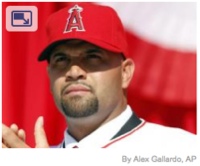-
Why Albert Pujols is Over-the-Top's New Best Friend
When baseball great Albert Pujols signed a staggering 10-year, $254 million deal with the Los Angeles Angels of Anaheim last week, he became over-the-top's (OTT) new best friend. That's right, everyone including Netflix, Hulu, YouTube and Amazon, plus countless online-only content producers, should have been celebrating Pujols's new riches. Why? Because the Pujols deal is the latest example of how pay-TV seems determined to price itself out of reach for certain segments of the population, opening up a huge window for OTT to succeed.
over-the-top's (OTT) new best friend. That's right, everyone including Netflix, Hulu, YouTube and Amazon, plus countless online-only content producers, should have been celebrating Pujols's new riches. Why? Because the Pujols deal is the latest example of how pay-TV seems determined to price itself out of reach for certain segments of the population, opening up a huge window for OTT to succeed.
The Angels' ability to pull off the Pujols mega-contact falls right in line with my post earlier this year, "Not a Sports Fan, Then You're Getting Sacked for At Least $2 Billion Per Year," where I explained that massive player contracts and sports rights programming fees are being subsidized in large part by non sports fans. Because sports networks like ESPN, TNT and regional sports networks ("RSNs") are included in the most popular tiers of digital programming, all subscribers to those tiers - whether they are rabid fans or couldn't care less about sports - are paying for them. Between their broad subscription bases and high monthly carriage fees, these networks have attained huge financial firepower.
In the Pujols situation, the Angels appear to have leveraged a new 20-year, $3 billion rights deal with Fox Sports West to afford Pujols, as well as star pitcher C.J. Wilson, who also nabbed a 5-year, $77.5 million deal last week. As the LA Times reported, Major League Baseball apparently allowed Angels owner Arte Moreno to opt out of his prior carriage deal with Fox last year, just halfway into its 10-year term, allowing him to renegotiate dramatically higher fees. Moreno capitalized on Fox's anxiety that Time Warner Cable - which earlier this year poached the Lakers' TV rights from Fox and broadcaster KCAL beginning in 2012 - might alter the balance of power in the LA market especially if it also gets the Dodgers' TV rights.
This turn of events are great for Moreno as the Fox deal and the addition of Pujols and Wilson clearly increase the value of the Angels (though it remains to be seen how these high-priced new players will translate to the Angels winning on the field; here in Boston we know the correlation between expensive free agents and winning ball games is tenuous at best). The problem of course is that Fox will now be going back to pay-TV operators in the LA area asking for higher carriage fees. Most operators will acquiesce and in turn raise their rates to cover their increased costs. In unrelated remarks last week Liberty Media's CEO Greg Maffei complained about this dynamic, saying it was "a tax on every American household," which drew a swift reply from News Corp's COO Chase Carey who said the industry should "respect the business models we built."
And that brings us back to why the OTT crowd is cheering, again. As the cost of basic digital service has soared to $60 or $70 per month, amid the financial squeeze many Americans face, it's no secret that pay-TV has created an affordability problem for itself. This is particularly true for the post-college cohort that had already shifted its viewing behavior online. These "cord-nevers," facing uncertain employment prospects, are simply being priced out of the market. They, and plenty of others - particularly non sports fans - will increasingly consider whether they can get by without pay-TV, simply by relying on lower-cost OTT alternatives.
In fairness, it's not just sports fees that have soared; as the LA Times also pointed out last week that programming costs at many entertainment-oriented networks have also increased rapidly, which in turn drives these networks to also demand higher carriage fees too. Then there are the broadcast networks' successful efforts to collect retransmission fees from pay-TV operators. All of this is contributing to pay-TV getting more expensive all the time. But the sports networks in particular are a pain point, because they are so much more expensive on a per channel basis, and because essentially all subscribers are asked to foot the bill. Pujols is obviously not literally OTT's best friend; rather he's just the latest face of a far larger trend in sports and the pay-TV industry.
Even as all this is happening, the choices available online, and the ability to watch them via connected devices, is improving. It's a situation that OTT providers will almost certainly capitalize on.
Categories: Cable Networks, Cable TV Operators, Indie Video, Satellite, Sports, Telcos
Topics: Albert Pujols, Angels, ESPN, FOX, Liberty Global, TNT

